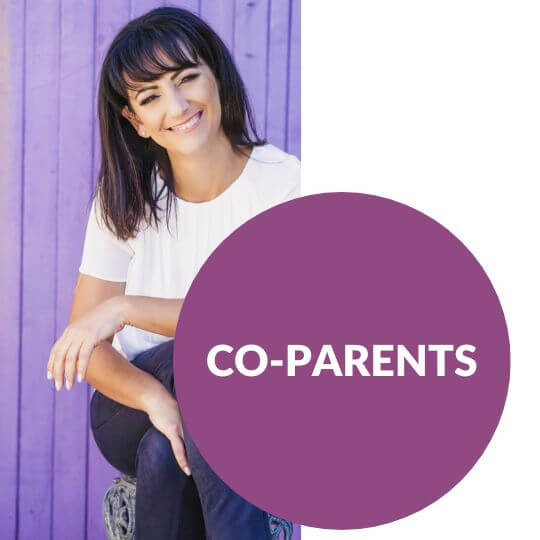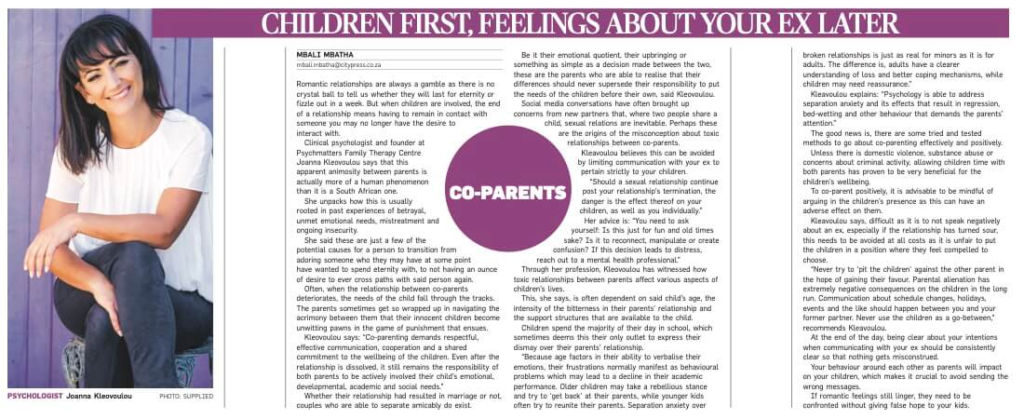Written by MBALI MBATHA – mbali.mbatha@citypress.co.za – CITY PRESS TRENDING 21 January 2024
Romantic relationships are always a gamble as there is no crystal ball to tell us whether they will last for eternity or fizzle out in a week. But when children are involved, the end of a relationship means having to remain in contact with someone you may no longer have the desire to interact with.
Psychmatters Family Therapy Centre Joanna Kleovoulou says that this apparent animosity between parents is actually more of a human phenomenon than it is a South African one. She unpacks how this is usually
rooted in past experiences of betrayal, unmet emotional needs, mistreatment and ongoing insecurity.
She said these are just a few of the potential causes for a person to transition from adoring someone who they may have at some point
have wanted to spend eternity with, to not having an ounce of desire to ever cross paths with said person again.
Often, when the relationship between co-parents deteriorates, the needs of the child fall through the tracks. The parents sometimes get so wrapped up in navigating the acrimony between them that their innocent children become unwitting pawns in the game of punishment that ensues.
Kleovoulou says: “Co-parenting demands respectful, effective communication, cooperation and a shared commitment to the wellbeing of the children. Even after the relationship is dissolved, it still remains the responsibility of both parents to be actively involved their child’s emotional, developmental, academic and social needs.”
Whether their relationship had resulted in marriage or not, couples who are able to separate amicably do exist.
Be it their emotional quotient, their upbringing or something as simple as a decision made between the two, these are the parents who are able to realise that their differences should never supersede their responsibility to put the needs of the children before their own, said Kleovoulou.
Social media conversations have often brought up concerns from new partners that, where two people share a child, sexual relations are inevitable. Perhaps theseare the origins of the misconception about toxic relationships between co-parents.
Kleavoulou believes this can be avoided by limiting communication with your ex topertain strictly to your children. “Should a sexual relationship continue post your relationship’s termination, the danger is the effect thereof on your children, as well as you individually.”
Her advice is: “You need to ask yourself: Is this just for fun and old times sake? Is it to reconnect, manipulate or create confusion? If this decision leads to distress, reach out to a mental health professional.” Through her profession, Kleovoulou has witnessed how toxic relationships between parents affect various aspects of children’s lives.
This, she says, is often dependent on said child’s age, the intensity of the bitterness in their parents’ relationship and the support structures that are available to the child.
Children spend the majority of their day in school, which sometimes deems this their only outlet to express their dismay over their parents’ relationship.
“Because age factors in their ability to verbalise their emotions, their frustrations normally manifest as behavioural problems which may lead to a decline in their academic performance. Older children may take a rebellious stance and try to ‘get back’ at their parents, while younger kids often try to reunite their parents. Separation anxiety over broken relationships is just as real for minors as it is for adults. The difference is, adults have a clearer understanding of loss and better coping mechanisms, while children may need reassurance.”
Kleavoulou explains: “Psychology is able to address separation anxiety and its effects that result in regression, bed-wetting and other behaviour that demands the parents’ attention.”
The good news is, there are some tried and tested methods to go about co-parenting effectively and positively.
Unless there is domestic violence, substance abuse or concerns about criminal activity, allowing children time with both parents has proven to be very beneficial for the children’s wellbeing.
To co-parent positively, it is advisable to be mindful of arguing in the children’s presence as this can have an adverse effect on them.
Kleavoulou says, difficult as it is to not speak negatively about an ex, especially if the relationship has turned sour, this needs to be avoided at all costs as it is unfair to put the children in a position where they feel compelled to choose.
“Never try to ‘pit the children’ against the other parent in the hope of gaining their favour. Parental alienation has extremely negative consequences on the children in the long run. Communication about schedule changes, holidays, events and the like should happen between you and your former partner. Never use the children as a go-between,” recommends Kleavoulou.
At the end of the day, being clear about your intentions when communicating with your ex should be consistently clear so that nothing gets misconstrued.
Your behaviour around each other as parents will impact on your children, which makes it crucial to avoid sending the wrong messages.
If romantic feelings still linger, they need to be confronted without giving false hope to your kids.




